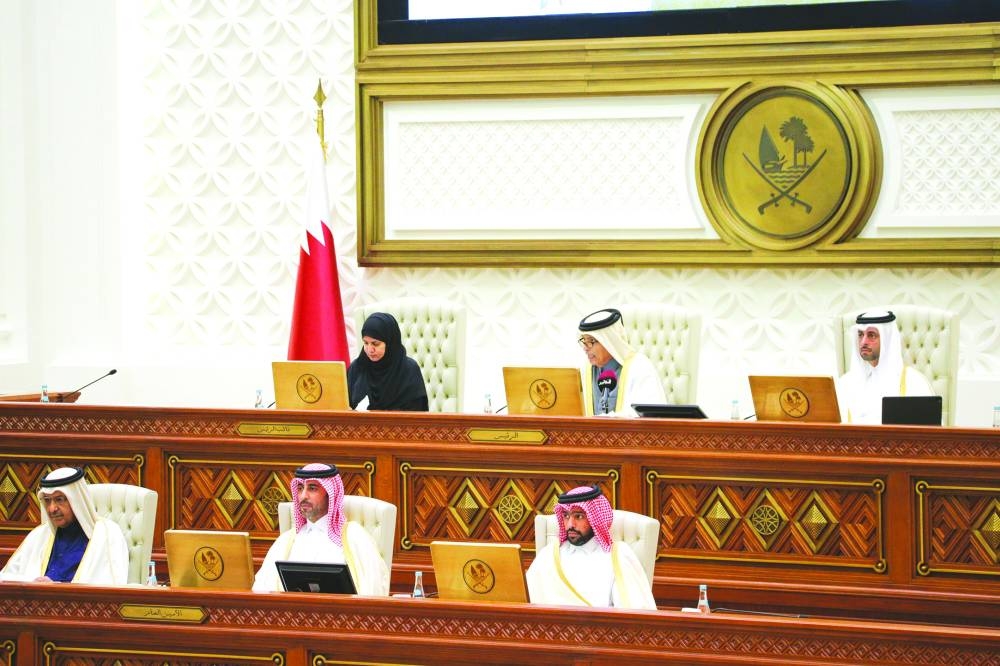The Shura Council held its weekly session on Monday under the chairmanship of its Speaker HE Hassan bin Abdullah al-Ghanem. At the outset of the session, HE the Speaker conveyed, on behalf of himself and Their Excellencies members of the Council, the congratulations and greetings to His Highness the Amir Sheikh Tamim bin Hamad al-Thani, His Highness the Father Amir Sheikh Hamad bin Khalifa al-Thani and His Highness the Deputy Amir Sheikh Abdullah bin Hamad al-Thani on the occasion of the National Day on December 18.
He also extended his congratulations to the Qatari people and all residents of Qatar, emphasising that this national occasion embodies the highest meanings of loyalty and cohesion between the wise leadership and the faithful Qatari people, and reflects the pride in the blessed journey of the country towards more progress and prosperity. In another note, the Shura Council expressed its strong condemnation and denunciation of the horrific massacre committed by Israeli occupation forces in the Nuseirat refugee camp in Gaza, which resulted in the death of dozens of Palestinians and injuries to many others.
The Council called for urgent international action to protect the Palestinian people and immediately stop the Israeli aggression, highlighting the importance of national parliaments and regional and international parliamentary unions in intensifying political and humanitarian efforts to alleviate the suffering of Gaza’s residents and prevent the deterioration of the security situation in the region.
The Council then listened to a presentation by HE the Minister of Municipality Abdullah bin Hamad bin Abdullah al-Attiyah on the ministry’s efforts and sectoral strategy for 2024-2030. In this context, HE the Speaker and the Council members praised the ministry’s efforts to enhance the quality of its services, achieve sustainable development goals, and implement programmes aimed at improving infrastructure. They commended the ministry’s services in food security, infrastructure development, and its role in regulating health inspections and ensuring food safety.
They emphasised the importance of the Ministry of Municipality’s role in achieving sustainable development goals, in line with the directives of the wise leadership, praising the ministry’s efforts to develop infrastructure and enhance food security, contributing to building a comprehensive society equipped for growth and prosperity.
HE the Speaker also praised the launch of the National Food Security Strategy 2030, which represents a significant step towards enhancing food security sustainability and meeting the community’s needs in line with Qatar National Vision 2030.
He stressed the importance of the ministry keeping pace with current challenges amid technological developments and global openness, indicating that the joint efforts between government bodies and the community are fundamental to achieving national goals and supporting the comprehensive development process, which enhances Qatar’s position as a leading model in sustainable development.
In his presentation, HE the Minister of Municipality outlined the key pillars of the ministry’s strategic plan (2024-2030), highlighting the ministry’s efforts to support the agricultural sector, enhance food security, develop infrastructure, prepare residential lands for citizens, and oversee food safety.
He detailed initiatives aimed at supporting local farm owners through technical and economic assistance to boost agricultural production and increase self-sufficiency in strategic goods.
The presentation also covered sustainable management of agricultural resources and enhancing the sector’s ability to adapt to climatic challenges, contributing to sustainable development goals. HE the Minister pointed out the significant progress made in recent years and the plans to increase self-sufficiency in certain agricultural and livestock products.
HE the Minister of Municipality pointed to the infrastructure development plan across the country, focusing on improving urban planning and implementing modern, flexible infrastructure projects using AI and simulation technologies.
He highlighted the importance of implementing the concept of “humanising cities” to improve urban environmental quality by enhancing green spaces and public amenities, improving residents’ well-being and achieving sustainable development.
Regarding the preparation of residential lands for citizens, he affirmed the ministry’s commitment to streamlining land allocation procedures and improving related services.

